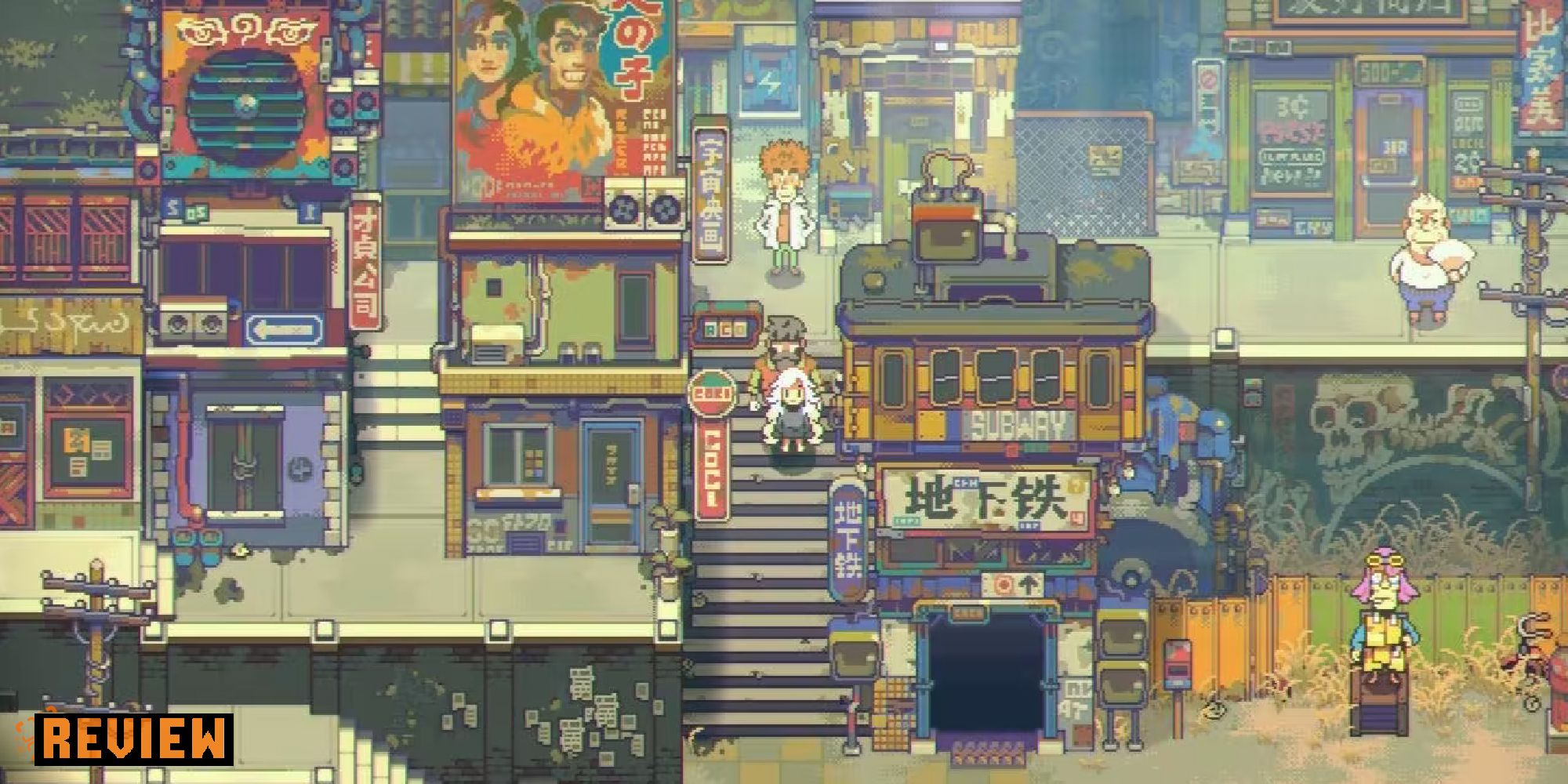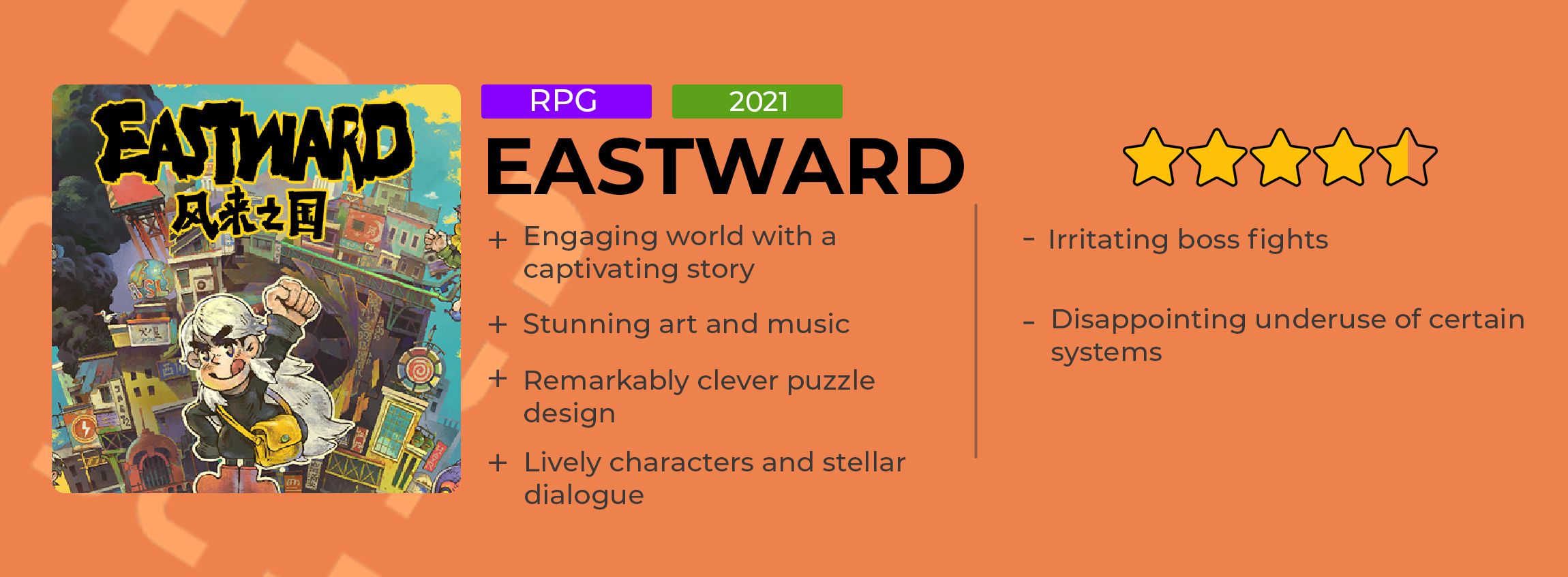Eastward is not the first video game to pit parent and child against the encroaching apocalypse. It is not the first video game to juxtapose vibrant colour and vital noise with a thematic core that is much darker. It is not the first video game to explore what happens when demagogues replace institutions in the wake of cataclysm, converting history into historiography as survivors become philistines not just by necessity, but by design.
And yet Eastward is stunningly original to the point of near overambition. Yes, not all of its ideas are novel. Yes, it will, often and almost brazenly, be comparable to its vast wealth of influences - it even has a minigame called Earth Born with an internal combat system that is remarkably similar to another relatively popular ‘Earth’ game, with all the necessary ‘mother’ lingo that comes with it. And yes, there will be occasions during which you will feel as if this is something you have seen before. Through it all, however, Eastward remains committed to carving out its own distinct identity, and, for the most part, it succeeds spectacularly.
From the bombed-out bombast of Potcrock Isle to the pastoral platitudes of Whitewhale Bay, to the hodgepodge urbanism of New Dam City and the clever liminality of rundown train stations, Eastward is set in a vast and varied world teeming with magic, the mundane, and magical mundanity. It is not so self-serious as other post-apocalyptic adventures - in my preview, I noted that it is absurd to the point of near nonsense. It is this very absurdity that allows Eastward to shine, though - what allows it to transcend all of those aforementioned sources in order to establish itself as something that is original, unique, and stunningly, almost annoyingly smart.
Eastward puts you in two different pairs of shoes - the ripped and rugged boots of John the miner and the ethereal slippers of his surrogate daughter, Sam. The game’s core loop revolves around integrating the playstyles of these two characters - they have different approaches to puzzles and their own distinct combat builds. While John wallops mammoth monsters with a wicked frying pan and lambasts them with the hell-scorched flames of a jerry-rigged flamethrower, Sam’s kit is more magical in nature. However, you can’t just pick who you prefer and waltz through the game without a care for the other person - Eastward, despite being a single-player game, is heavily invested in the idea of cooperation.
For example, moment-to-moment play largely involves traversing dungeons separated into individual levels. Combat functions like a twin-stick shooter, while the path forward is often split into two independent streams. Sam, John’s adopted daughter, is powerless beyond temporarily immobilising enemies, while John’s puzzle-solving ethos rarely extends beyond blowing shit up. You work together by having John thwack spike-backed turtles and sentient fungi with his trusty frying pan while Sam dematerialises overgrown onions and uses non-sentient fungi to illuminate the darkness. There are sorcerer cows, hydra-headed Venus flytraps, and golden slugs who electrocute themselves every five seconds. While most of the game revolves around a balancing act of solving puzzles and defeating these wild and wacky creatures, there is never a dull moment due to just how varied everything is - and just how much of a team John and Sam truly are.
This is one of the main things that separates it from other stories set in a post-disaster world: its heart lies in family and friendship and forging through adversity as a unit. Without this thematic base, its warmth would feel out of place, its jokes would never land, and it would, inevitably, feel just like all those other stories it manages to not just avoid, but brilliantly subvert.
That subversion is worth expanding on, too. On one hand, the events of Eastward transpire in a world where a Matrix-esque human farm is located beneath a train station with a beached and breathing whale on top of it. On the other, this is a world filled with mayors sporting walrus moustaches, photo shoots dedicated to the deity of cheese, and rubber duck monsters who spit spherical duckling bombs at you. It’s packed with Austenian marital melodrama, Wildean absurdist hyperbole, Dickensian veiled nonsense, and a sense of humour that would give Terry Pratchett a decent ab workout. Put plainly, it is extremely clever but never pretentious, despite how ostensibly pretentious my previous sentence might seem. Eastward is well read and better spoken.
This might seem like a bit of an unconventional review: I haven’t gotten into the nitty gritty of its relatively robust combat, or waxed lyrical over dungeon design, puzzle variety, or its gorgeous art and wonderfully weird soundtrack. That is intentional, because playing Eastward is acknowledging and appreciating the sum of its parts. It is an impressively cohesive experience that would only suffer if it were to be divided into, in this instance, arbitrary items on a stale checklist denoting the top ten quality-affecting factors of what constitutes a ‘good’ game. When I think about Eastward now, as I write this review, the ideas that endure are tied to its atmosphere, its tone, its mood, its feeling. There is life to its lyricism and vitality to its verbs. To relegate that coherence by stripping it of what makes it coherent would be to do a disservice to what is quite frankly one of 2021’s best and brightest games to date.
This brings me to an intriguing part of my review, where I feel obliged to admit that I have yet to actually finish Eastward. When I gained access to my preview build, I was able to explore the entire game, so I played through quite a bit of Eastward and waited for the official review build to continue my journey in a newer, more refined version of the game. Unfortunately, my progress didn’t transfer across to this new build - something that came as quite a surprise considering I had planned my play sessions around the fact that I had, in fact, already been through the vast majority of the game. So, this weekend, I started again and was cracked across the skull with a cinder block. All of a sudden, the very thing that makes Eastward so special made sense: I didn’t want to rush. Eastward is surprisingly - if not deceptively - long. To storm through it at blistering speed to make a review embargo just felt like I was actively compromising my enjoyment of one of my favourite games of the year. And so, I’ve stopped to smell the post-apocalyptic roses.
It would be remiss to talk about Eastward only in terms of what it does well, though. Despite how much I appreciate the atmosphere and outlook of its world, I also take issue with quite a lot of its design choices. Boss battles are often overly persnickety thanks to the twin-stick shooter combat style and intensely precise counter requirements. It is, at times, a little bit bloated - while I have already mentioned how much I enjoy taking my time in this world, there is occasionally an overabundance of cutscenes that, while lively and vital in their own right, can overestimate themselves in terms of engagement. Systems like cooking, considered central not just to the mechanics of the game, but the narrative itself, are confusingly underused. The gorgeousness of the game’s overworld often comes into tension with its rather unintuitive UI. Simply put, there are minor but constant grievances throughout the entire experience that exist as a sort of phantom, unscratchable itch. It is irritating in a similar vein to remembering a light mosquito bite once every ten minutes where the other 599 seconds are spent enjoying a beer on the beach.
All of that said, denouncing Eastward’s strengths and successes for any of the above would be disingenuous. It is a remarkable game that, while retro in ambition, will paradoxically go on to inspire the drive and uniqueness of future projects. It is clever, vibrant, and unapologetically original, and unless some magnificent twist of fate occurs over the next three months, it will undoubtedly go down as one of the best games of the year.
Score: 4.5/5
A PC review code for Eastward was provided by the publisher.


.png)
.png)
-1.png)
